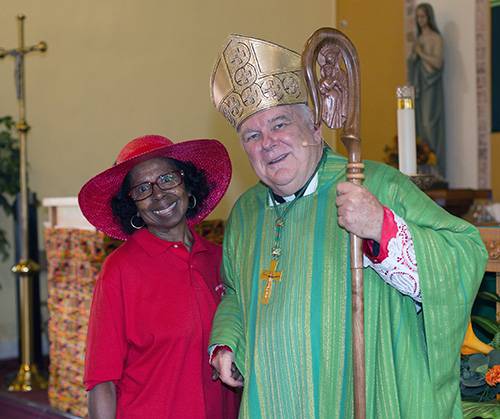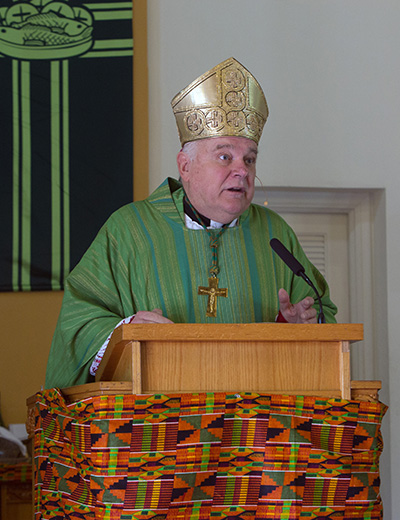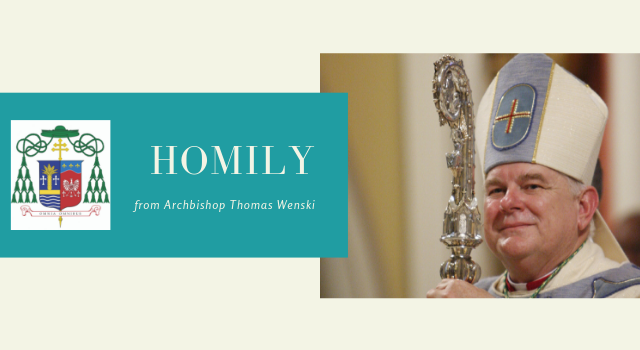By Archbishop Thomas Wenski - The Archdiocese of Miami
Archbishop Thomas Wenski preached this homily Nov. 3, 2019, at St. Philip Neri Church, Miami Gardens, as the black Catholic community celebrated Black Catholic History Month, which takes place in November. Click here for gallery of Mass photos.
Isn’t it good for us to be here? We’re at the table of the Lord and Jesus has prepared a meal for us: the bread of life and the cup of salvation.

Photographer: MARLENE QUARONI | FC
Lona Bethel Matthews poses with Archbishop Thomas Wenski after the Mass he celebrated for Black Catholic History Month, Nov. 3, 2019, at St. Philip Neri Church, Miami Gardens.
Of course, we come here to celebrate Black Catholic History Month – a month that began with All Saints Day. You know that New Orleans’ anthem: Oh, when the Saints, Oh, when the Saints go marching in. Oh, I want to be in that number when the Saints go marching in. Well, Black Catholic History reminds us that among that number there are a lot of people that looked like you. Today, is the feast day of St. Martin de Porres – his life and his example of humility is certainly part of Black Catholic History. But so were those blacks – both freed men and slaves – whose names appear in the baptismal register of St. Augustine Parish dating from the 1530s. And certainly, names like Pierre Toussaint, Mother Elizabeth Lange, Father Augustine Tolton, Julie Greeley and Sister Thea Bowman – all African Americans on their way towards being canonized as saints – remind us that black Catholics have been part of the Catholic Church in this country from its very beginnings. But black Catholics have been part of the Catholic Church from apostolic times: in the Acts of the Apostles, we read of the Ethiopian eunuch baptized along the roadside by the deacon Phillip.
Today’s Gospel reading tells us about Zacchaeus and his “to Jesus meeting.” (Have you ever imagined what Zacchaeus might have looked like, what kind of a character he was? Sometimes I imagine him as the character, Leo Getz, Joe Pesci played in Lethal Weapon with Danny Glover and Mel Gibson; or the character he played in Goodfellas.)
At any rate, he was a hated tax collector – and, at the time of Jesus, tax collectors were both corrupt and sellouts (they worked for the Romans). Zacchaeus was also a short man – too short to see Jesus. It might be that St. Luke meant his shortness to be also a metaphor for a spiritual blindness. Sin makes us blind – sin makes us unable to see the Lord. (Remember what Jesus said in his Sermon on the Mount: “Blessed are the pure of heart for they shall see God.”)
Zacchaeus was short – and not pure of heart. He was a rich man – maybe a financial giant but probably a moral midget. But he was apparently curious. Too short to see Jesus, he climbs a sycamore tree and he encounters Jesus and his life is changed.
There are those who think that they have made such a mess of their lives that God wouldn't want to have anything to do with them. They are, of course, quite wrong. Zacchaeus and Matthew, both tax collectors, had taken wrong paths but Jesus ate with them; the woman caught in adultery, and the Samaritan woman, had made messes of their lives and yet Jesus loved them – he loved them in truth; that is, without either the sentimentality or false compassion that would excuse the sin or pretend that it didn’t matter. Jesus doesn’t want to bless our sins; he wants to forgive them.
Sometimes people carry with them a heavy load of guilt, guilt that tortures them; and sometimes they try to self —medicate themselves – with booze, with drugs, with sex, with trying to buy friends or buy happiness through conspicuous consumption. They – much like Zacchaeus – can’t see their way clear. Too short. Too blind.
If it is true that every saint has a past, it is also true that every sinner has a future. The door to that future is open always for us – it is the door of the confessional where sins committed after baptism are forgiven. You know how to get rid of guilt? Get rid of the sin; then you will be rid of the guilt. God never gives up on us until he has forgiven the wrong and overcome rejection with compassion and mercy.

Photographer: MARLENE QUARONI | FC
Archbishop Thomas Wenski preaches the homily during the Mass he celebrated Nov. 3, 2019, for Black Catholic History Month at St. Philip Neri Church, Miami Gardens.
Now you might be saying to yourselves: “Well, I’m not as bad as Zacchaeus and those other people.” Maybe not, but you’re not as good as you want people to think you are either. Yet, the Lord calls all of us; he invites us to eat with him. He wants to restore us to wholeness, to bring us back into a wholesome way of living. Zacchaeus’ encounter with Jesus over a meal changed him: he’s going to pay back four times more what he stole. He is going to make amends. Our encounter with Jesus at this banquet we call the Holy Eucharist should change us: in eating His Body and drinking His Blood, he becomes part of us; but he wants to make us part of him.
As Pope Francis wrote in Evangeliae Gaudium, “The joy of the Gospel fills the hearts of all who encounter Jesus; those who accept the love of God and his offer of salvation are set free from sin, sorrow, inner emptiness and loneliness.”
Again, we are here to celebrate Black Catholic History Month – and, as I said, history always has both lights and shadows. Despite the shadows that we know too well, black Catholics haven’t given up on their Church. And, praise the Lord for those sycamore trees placed along our way that helped us to overcome our “short” comings and to meet and know the Lord.
Among these sycamore trees, we must single out our Catholic schools that continue to educate black children – both Catholic and non —Catholic; our historic black Catholic parishes, like St. Philip Neri and Holy Redeemer; and organizations like the Knights of St. Peter Claver and the National Black Catholic Congress.
But the most important tree for us to cling to is the tree on which Jesus was hung. Just as Jesus stopped by the sycamore tree for Zacchaeus, he meets us at the cross.
May we always embrace the wood of that old rugged cross so that Jesus will say of us what he said of Zacchaeus: “Today salvation has come to this house, because this man, too, is a son of Abraham. For the Son of Man came to seek and to save the lost.”
Oh, when the saints, Oh when the saints, Oh when the saints go marching in, Oh I want to be in that number, when the saints go marching in.

